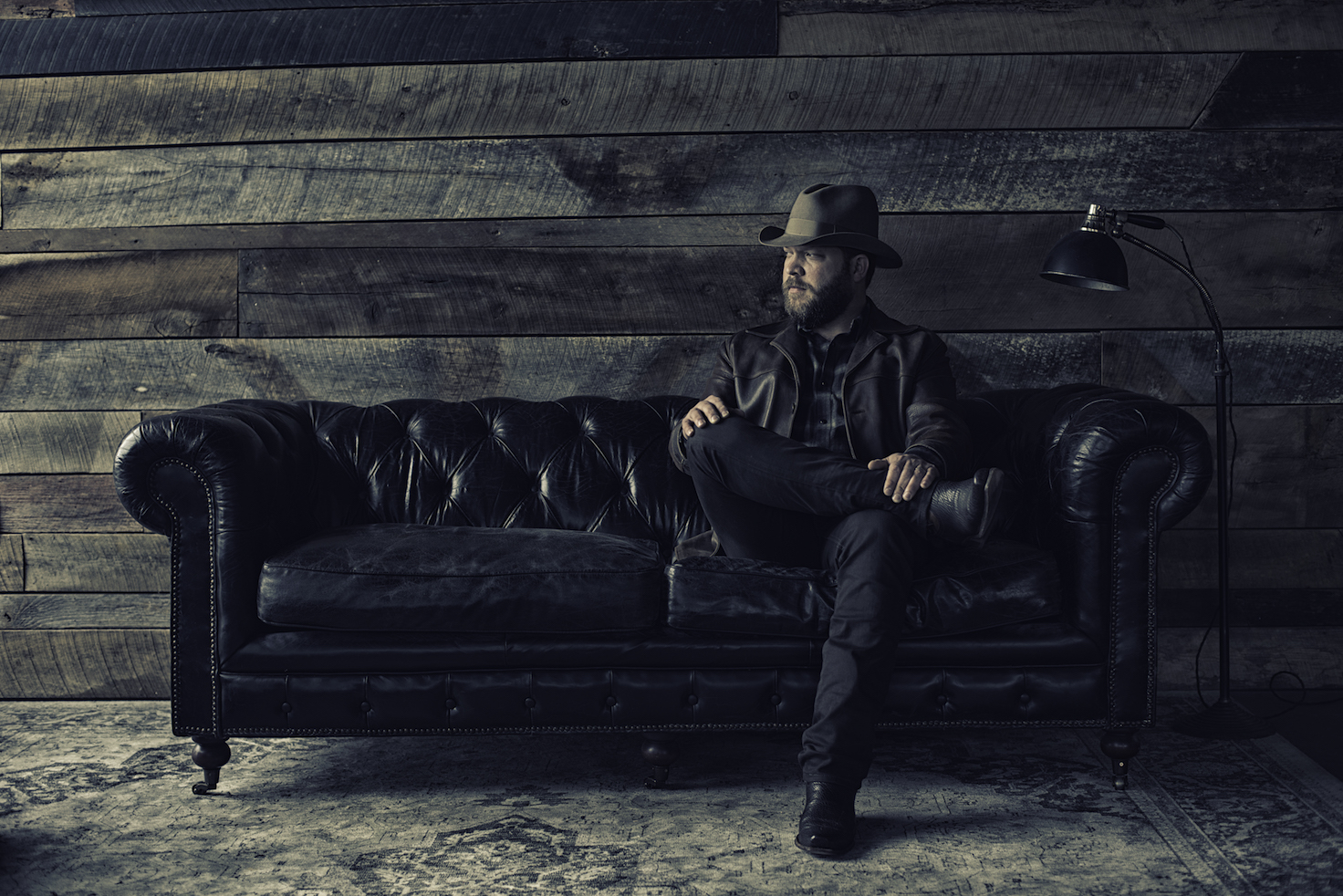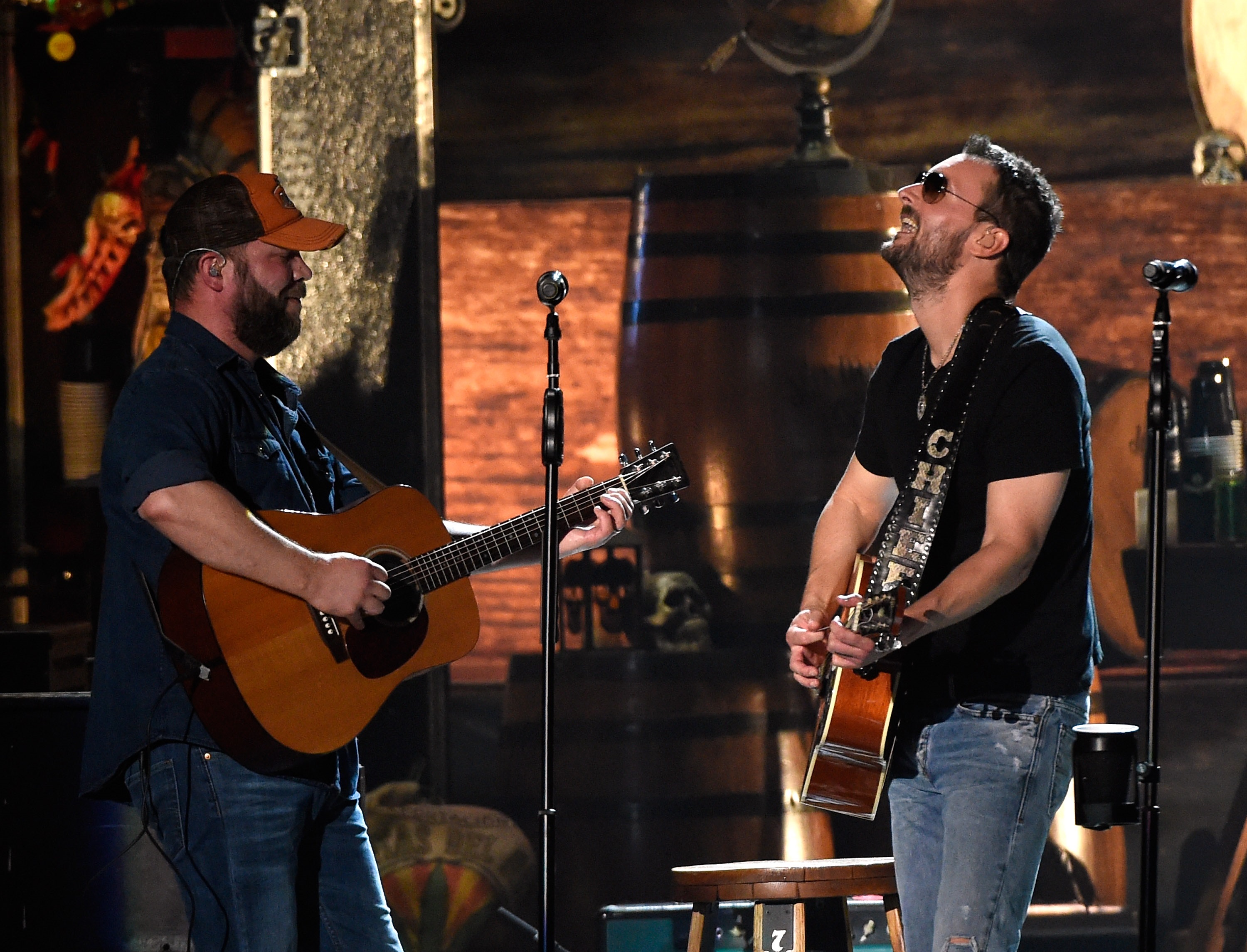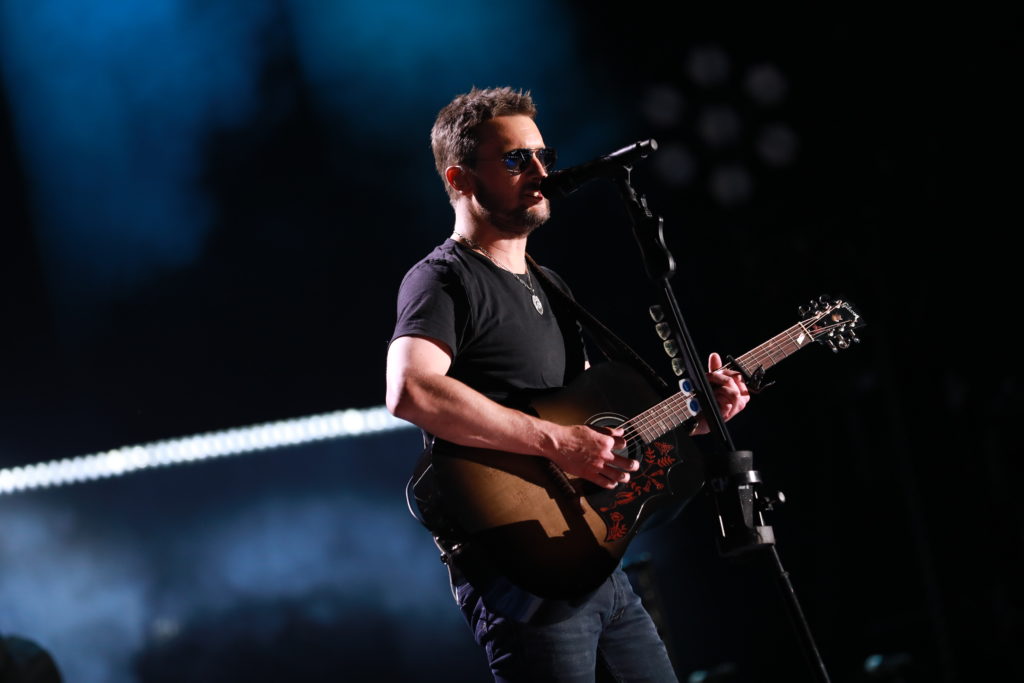The Writers Round with Jeff Hyde
Hyde wrote Eric Church's "Springsteen" and "Smoke a Little Smoke" among others.

Welcome to the Writers Round, a monthly column where Sounds Like Nashville sits down with Nashville-based songwriters and learns about each writer’s journey to Music City. This month, Jeff Hyde sheds some light into his life as a songwriter as well as shares the stories behind some of his many hits including Eric Church’s “Springsteen” and “Smoke a Little Smoke.”
As a child, Jeff Hyde’s home in Texas was filled with music. His father was a huge Statler Brothers fan and loved country music, as did his grandparents. Music was always played in the house and, as a result, Hyde began writing songs at an early age.
“I would put different words to a known melody,” Hyde tells Sounds Like Nashville over the phone, recalling his early songs. “Everybody has natural talents and that was just something that was the easiest for me out of everything else I tried. From a young age, I can remember having a natural inclination towards music.”
Hyde remembers studying the liner notes on records and learning who wrote the songs he played along to. That knowledge helped steer his passion for country music and by the time he was in high school, he and his brother were bona fide musicians who performed frequently around town at local events.

Jeff Hyde; Photo courtesy of The Press House
When it came time to start thinking about what to do after high school, Hyde admits that the idea of a career in music wasn’t on his radar. Instead, he thought he’d go to forestry school. When he told his dad about becoming a forester, he was perplexed.
“He said, ‘Son, if I had seen you walking around measuring trees and writing down notes about bark and that kind of thing, I might get behind supporting that. But I’ve never seen you do nothing but sing and play guitar,'” Hyde recalls with a hearty laugh. “I just figured that I should try to do what I had always wanted to do.”
Hyde eventually decided on a school in West Texas called South Plains College, which had a commercial music program. The program was supported by one of Hyde’s influences, songwriter and Country Music Hall of Famer Tom T. Hall. While in school, he had dreams of Nashville and recalled advice a man from Nashville gave him after hearing him play a local talent contest: “If you’re gonna fish for sharks, you gotta be fishing in the ocean. The best songwriters and the people who can actually help you do something with it from country music are in Nashville so you need to be there at some point.”
Hyde says it was this advice that made him realize he had to spend some time in Nashville if he expected to make progress with his songwriting. After several trips with his family, Hyde moved to Music City in 2001. During his early years, Hyde held several jobs as he pursued his dream as a songwriter including working in the mail room at BMI and at the Grand Ole Opry in the concession stands. All the while, he attended Middle Tennessee State University as he pursued a business degree and would frequently travel to Nashville for writer’s nights and open mic nights in hopes to find a way to break into the industry.
One of Hyde’s early supporters was Jody Williams at BMI. Liking what he heard, Williams gave the budding songwriter an open door policy and told him to bring him songs he felt strongly about as he continued to grow as a writer.

NASHVILLE, TN – JULY 30: Guitarist Jeff Hyde joins Singer/Songwriter Eric Church for the opening of the new Ascend Amphitheater with the first of two sold out solo shows on July 30, 2015 in Nashville, Tennessee. (Photo by Rick Diamond/Getty Images)
“You move to town thinking you’re going to catch the world by the tail and you realize you still have to hone your skills to compete with these people,” Hyde explains with a thick Texas accent. “Jody basically said, ‘As you write songs you’re proud of, come play them for me.’ We did that. Now and then, he’d like a song enough to help me demo it or he’d say, ‘I’m not sure about that one.’ We had a relationship like that for a couple of years and he ended up signing me to my first publishing deal. Jody was a real help to mentor me and help me learn things to do and not to do. That was my first break into the songwriting business.”
Hyde signed his first publishing deal in 2005 and admits around that time he’d play for anyone who would listen. He’d get plenty of constructive criticism from people in the industry and took each comment to heart.
“It can either discourage you or it can light a fire in your gut to take the bits and pieces of their advice that you see some value in and try to get that much better,” he notes.
The Texas native never had a plan B and he remembers difficult talks with his parents early on in his career. One phone conversation had his dad asking how much money he made from songwriting and Hyde said nonchalantly that his salary was $20,000, to which his dad informed him was poverty level. Despite the low income, Hyde persisted.
“I had people back home say prayers for me before I came and I had faith that if this was what I was supposed to do, I had to give it a little bit of time,” he explains. “There’s a lot of talented people that come to town that you don’t necessarily hear about because they get discouraged and move back home. They say it’s a five-year town and everybody thinks, or at least I thought, it won’t be for me. But it is. There’s a lot of truth in that and you have to give it some time. If you get discouraged, it’s easy to give up but you have to stick with it to have any success at it.”
Hyde was patient when pursuing his craft and five years after he signed a publishing deal, his first major cut was released to radio. Hyde co-wrote Eric Church’s “Smoke a Little Smoke” with the singer and bandmate Driver Williams, and admits the song almost never saw the light of day.
For the past 12 years, Hyde has played in Church’s band. While on the road one night, he, Church and Williams sat in the front lounge of the tour bus writing what would become “Smoke a Little Smoke.” The song came quickly and the three had it complete within an hour. While they thought it was a cool track, Hyde admits that he forgot about the song and it wasn’t until months later that Church mentioned it again to him.
“When he went in to record an album, he called me and asked if I still had the lyrics to that song and I said, ‘Oh yeah, I think I’ve got ‘em.’ But I didn’t have them. I couldn’t find them anywhere,” Hyde confesses. “So I texted Driver, ‘Do you have those lyrics?’ He didn’t have them and Eric didn’t have them. Driver said, ‘Are you kidding me? I didn’t think we’d ever hear about that again.’ I sat down and said a little prayer. I said, ‘Please help me find these lyrics.’ I went and opened the top drawer in this other room and they were right there on the top. That’s an example of a song I didn’t think would ever do anything and almost slipped through the cracks when none of us could find the lyrics.”
Hyde says Church’s producer, Jay Joyce, took the song to another level with his arrangement and he was glad it made the record. He never imagined it’d become a single because as Hyde explains, the odds are typically against you. When Church did decide it would be his next single, he called Hyde personally to tell him the good news.
“That was my first single, so we were excited about that. He knows what a big deal it is for a songwriter and he knew that was going to be my first one,” Hyde says. “Then we started seeing how people reacted to it at the shows. They would just go nuts. We noticed a big difference…it seemed like that was part of a turning point for the growth of our shows. It was a slow build, Eric’s career. We played every small club that you could think of. He had a real loyal fan base at that point. They were primed and ready, and with the right combination with a couple songs it really ramped it up. That was one of them that made a difference.”

Eric Church; Photo credit: Natasha Moustache/CMA
Hyde went on to have several hits with Church, including “Round Here Buzz,” “Record Year” and “Springsteen.” While he’s been in his band for over a decade, Hyde says it took some time for the two to write together. Hyde first met Church through Jody Williams’ son, Driver, who was working at the same publishing company he wrote for. He learned that Church needed a substitute banjo player for a few shows so Hyde played with the band. When Church’s banjo player left, they reached out to Hyde and asked if he’d be interested playing a few more shows so he did. On a handshake, Church later told Hyde that he could stay as long as he wanted.
“I ended up staying and it’s been a really good thing. I didn’t pressure Eric about writing,” he adds. “One thing I learned the hard way…when I first moved to town, I think I approached a couple of songwriters before I was ready asking about a co-write. It didn’t go too good. I hate to ask people for anything so I got nicely shot down a couple times and that was enough to make me reconsider how I was going to approach co-writing.”
Hyde says he decided that he needed to work at honing his skills enough to where his songs could ask for a co-write. This is exactly how he approached things with Church. They had mutual contacts in the business and Church’s wife worked at the publishing company where Hyde was signed so she knew his songs. Over the span of two years, Church had come to hear some of the songs Hyde had written and eventually approached him to write together. They immediately clicked during their first co-write and their writing partnership developed naturally.
When Hyde isn’t on the road with Church’s band, he keeps his writing schedule full in Nashville. As he explains, he looks at songwriting as much of a job as a road musician. In addition to writing in Nashville, Hyde often writes on the road and that’s how Church’s Grammy-nominated hit, “Springsteen,” came to be.
While on tour, Hyde’s friend and co-writer Ryan Tyndell came out to write with Church. Hyde walked on the bus and saw the two working on a song in the front lounge but didn’t want to interrupt so he continued through to his bunk. Church later came back and told him to get out of bed and to help write the song with them, so he did.
“They had the first half of the first verse written and when I heard those lines I understood exactly what they were talking about. They had a cool picture set right from the beginning. We wrote that song…it was a pretty easy song. Maybe a couple hours we had that one done,” he shares. “I remember stopping at a truck stop and getting out and I asked Katherine, Eric’s wife, ‘Do you think it’s a pretty good song?’ And she said, ‘Yeah, that’s a good one.’ You never know. For it to have gone on and been the success that it has, it’s been a blessing. We’ve been to Germany, the U.K. and Norway, all kinds of places, and people sing along to that song.”
After years penning hits for other artists, Hyde released his debut solo album, Norman Rockwell World, last month. Each of the 10 tracks were co-written by Hyde, who approached Tyndell to produce the album. Having a catalog of songs that hadn’t been cut by other artists, he wanted to give those songs life.
“Every writer has a pile of songs that they’re proud of and all of them can’t be recorded by a major artist. A lot of times those songs get forgotten about,” he admits. “As a songwriter, you feel like you’re only as good as the last song you wrote. So, you’ve got to keep on looking forward rather than being proud of the songs you’ve already written.”
Hyde wrote the album’s title track around six years ago and says it’s a special song that discusses how the world often seems to move at a breakneck pace and how he’d like things to slow down.
“Sometimes it feels like the world is moving a lot faster than I want to move,” he admits. “One reason shows like Andy Griffith were so popular, sometimes people want to escape from the craziness. When I go back home, you’re not about to get run over every time you pull out on the highway. Traffic’s a lot slower and it seems like a slower pace. But, I guess, life is hard no matter where you are.”
Hyde says there’s a piece of himself on each track of Norman Rockwell World. One of the most honest songs on the project is “Henry Ford,” which is based on a quote he heard Don Williams say years ago. As Hyde recalls, Williams was being interviewed and was asked why he shunned the spotlight when he wasn’t on the stage.
“He said, ‘I always felt like you didn’t have to know Henry Ford to drive one.’ I remember hearing that when I was a teenager and it always stuck with me. It was basically his way of saying, ‘Walk softly, but carry a big stick.’ I think there’s a lot of truth in that,” Hyde explains. “As far as honesty, I think that song sums up the way I feel about a lot of things. I think what you do speaks louder than what you say in a lot of ways.”


